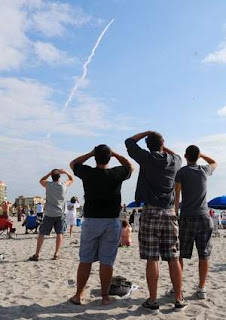Kennedy Space Center adapting to changes
In a new TV ad promoting Space Coast tourism, unmanned Delta IV and Falcon nine rockets blast off and a cruise ship sets sail as representatives from three companies proclaim, "We launch from here."
The ad reflects the new reality that after shuttle Atlantis blasts off Friday, the area will not launch humans again for at least several years.
But it is also a reminder that meaningful space launches from Brevard County will go on, even after the retirement of what has been the area's signature spaceflight program for the past thirty years.
"We are pushing that it is just as cool to watch a Falcon nine take off as the shuttle," said Rob Varley, director of the county's tourism agency.
While acknowledging the difficult economic and emotional hit caused by the shuttle's end, local and NASA officials are promoting reasons for the Space Coast to be optimistic about its future.
More than eight thousands people still will report for work at Kennedy Space Center, and several interplanetary NASA science missions are nearing launch from the Cape. SpaceX by year's end could become the 1st private company to send a vehicle to the International Space Station.
To bolster the "yes, there's life post shuttle" message, NASA plans to outline soon how it will build a rocket able to take astronauts on exploration missions beyond low Earth orbit, where none ventured during the shuttle era.
And additional announcements are expected to show how KSC is transitioning to embrace developers of private space taxis that could bring new jobs.
So far, that optimistic outlook has been overshadowed by a gloomier narrative, one that frames the shuttle's retirement as the end of U.S. human spaceflight, considers NASA's path forward vague and imagines Kennedy Space Center virtually shutting down.
The past 2 years, after all, have produced a steady tide of negative news about shuttle contractor layoffs that will peak with roughly two thousands more job cuts at KSC after Atlantis lands.
"The end of a program, something that a lot of these folks have been with for thirty years, it is difficult," said Mike Leinbach, the shuttle launch director. "The mood is getting more and more somber."
After a lengthy policy and budget debate in Washington, much of the public knows that the 1st shuttle successor program was canceled and the U.S. soon will depend on Russia for access to space.
"The civil space program has been clouded in an aura of political uncertainty for the past couple of years, and I believe strongly that is about to be clarified," said Frank DiBello, president of Space Florida, the agency charged with growing the state's aerospace industry. "That will relieve a lot of anxiety, and demonstrate clearly that it is not over."


Comments
Post a Comment